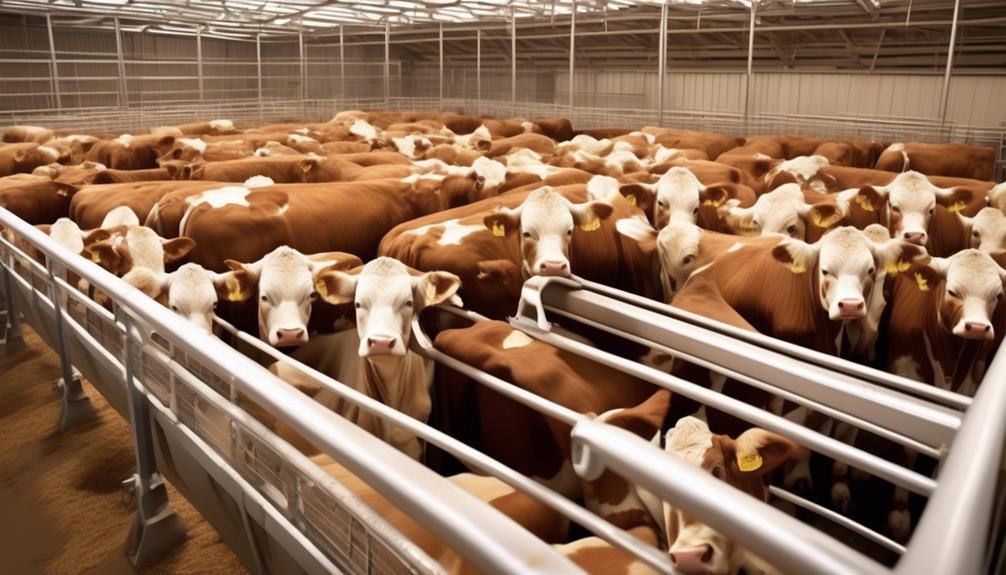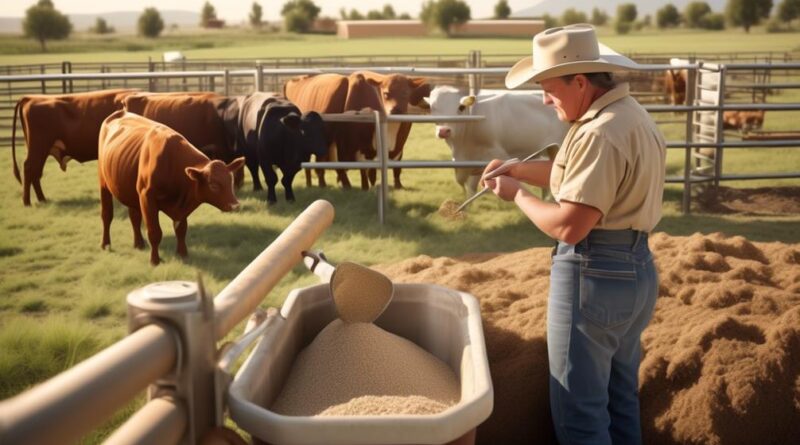Optimizing Cattle Feeding Management: Top Tips
When it comes to optimizing cattle feeding management, there are numerous nuances and necessities to navigate. From feed quality assessment to cost-effective feed management, the intricacies of ensuring your cattle are well-fed can seem overwhelming.
However, by implementing a few top tips, you can streamline your approach and enhance the overall efficiency of your cattle feeding management. Whether it's maximizing feed utilization or mitigating environmental impact, there are key strategies that can significantly impact your operations.
Feed Quality Assessment
Assessing the quality of feed is essential for ensuring the health and productivity of your cattle. When it comes to feed sourcing, it's crucial to obtain high-quality ingredients to meet the nutritional needs of your cattle. Conducting a nutritional analysis of the feed is a key step in evaluating its quality and suitability for your livestock.
To start, consider the nutritional content of the feed. Look for feeds with a balanced ratio of protein, carbohydrates, vitamins, and minerals to support the dietary requirements of your cattle. Nutritional analysis will help you determine if the feed meets these criteria, ensuring that your cattle receive the necessary nutrients for growth, reproduction, and overall health.
Additionally, assess the feed for any potential contaminants or toxins. This step is critical to safeguarding the well-being of your cattle. Look for signs of mold, bacterial contamination, or foreign objects in the feed that could harm the animals. By conducting a thorough assessment, you can mitigate the risk of health issues arising from poor-quality feed.
Feeding Schedule Optimization
To optimize your feeding schedule for cattle, consider their specific nutritional requirements and daily activity levels. Start by analyzing their feeding behavior and nutrient balance to ensure they receive the necessary nutrients at the right times. Understanding their grazing management and forage utilization patterns will help you create a feeding schedule that aligns with their natural behaviors.
Feeding behavior analysis is crucial for determining the best feeding schedule for your cattle. By observing when they're most active and likely to consume feed, you can adjust the feeding times to maximize nutrient intake. Additionally, understanding their nutrient balance requirements will help you tailor the feeding schedule to provide the right mix of proteins, carbohydrates, and other essential nutrients.
Grazing management plays a significant role in feeding schedule optimization. If your cattle have access to pasture, consider their grazing patterns when scheduling supplemental feedings. This can help prevent overfeeding or underfeeding, ensuring that they receive the appropriate amount of nutrition throughout the day.
Forage utilization should also be taken into account when optimizing the feeding schedule. Understanding how much forage your cattle consume and when they prefer to graze will allow you to schedule feedings to complement their natural grazing behavior. This approach can help improve overall feed efficiency and ensure that your cattle receive the nutrients they need to thrive.
Water Access and Quality
When optimizing your cattle's feeding schedule, ensuring proper water access and quality is vital for their overall health and well-being. Proper hydration management and water quality testing are essential to keep your cattle healthy and productive.
Here are some top tips to ensure optimal water access and quality for your cattle:
- Regular Water Testing: Regularly test the water sources available to your cattle for contaminants, pH levels, and mineral content. This helps in ensuring that the water is safe for consumption and promotes the overall health of your cattle.
- Clean Water Sources: Ensure that the water sources are clean and free from any debris or contaminants. Clean water helps in preventing waterborne diseases and encourages your cattle to drink an adequate amount of water for their hydration needs.
- Adequate Water Supply: Make sure that there's an adequate supply of water available to all your cattle. Proper water availability is crucial, especially during hot weather, to prevent dehydration and heat stress.
- Water Accessibility: Ensure that water sources are easily accessible to all cattle in the herd. This helps in preventing dominance-related issues and ensures that all cattle have equal opportunities for hydration.
Monitoring Feed Consumption
Keeping track of your cattle's feed consumption is essential for ensuring their nutritional needs are met and optimizing their overall health and productivity. Monitoring feed intake allows you to assess if your cattle are receiving an adequate amount of nutrients and calories. It also helps in identifying any potential issues such as decreased appetite, which could indicate health problems or suboptimal feeding conditions. By keeping an eye on feed consumption, you can make necessary adjustments to maintain the nutritional balance required for your cattle's well-being.
Regularly monitoring feed consumption provides valuable insights into your cattle's dietary habits and preferences. This information can be used to fine-tune their diet, ensuring that they're receiving the right balance of proteins, carbohydrates, vitamins, and minerals. By understanding their feed intake patterns, you can also detect any fluctuations that may indicate stress, illness, or changes in environmental conditions. This proactive approach enables you to address any issues promptly, promoting better overall health and performance in your herd.
In addition to maintaining nutritional balance, monitoring feed consumption can also help in managing feeding costs. By accurately tracking the amount of feed consumed by your cattle, you can minimize waste and optimize feed utilization. This not only benefits your cattle's health but also contributes to efficient resource management on your farm. Regularly assessing feed intake is a proactive measure that supports the well-being and productivity of your cattle while promoting efficient farm management.
Health and Nutrition Considerations
Monitoring the health and nutritional status of your cattle is crucial for ensuring their well-being and productivity. Proper health and nutrition considerations are essential to optimize cattle feeding management. Here are some key factors to consider:
- Nutritional Balance: Ensuring that your cattle receive a balanced diet is vital for their overall health and performance. A balanced diet should include the right proportions of energy, protein, vitamins, and minerals to meet the specific nutritional needs of your cattle.
- Disease Prevention: Implementing effective disease prevention measures is essential for maintaining the health of your cattle. Regular vaccinations, parasite control, and proper sanitation practices are crucial for preventing diseases and promoting overall well-being.
- Regular Health Monitoring: Conduct regular health assessments and monitor the body condition of your cattle to ensure they're thriving. Address any signs of illness or nutritional deficiencies promptly to prevent potential health issues.
- Consultation with Nutrition Experts: Seeking advice from nutrition experts can help you develop and maintain an optimal feeding program for your cattle. Nutrition professionals can provide valuable insights into formulating balanced diets and addressing specific nutritional requirements based on factors such as age, breed, and production stage.
Managing Feed Storage and Handling
Proper management of feed storage and handling is essential for preserving the quality and nutritional value of the feed for your cattle. To ensure feed preservation, it's crucial to store feed in a clean and dry environment. Moisture can lead to mold growth, which can spoil the feed and reduce its nutritional value. Therefore, invest in proper storage facilities that protect feed from the elements, such as moisture and sunlight.
Additionally, regular inspection of storage areas is necessary to identify and address any potential issues promptly.
Rodent control is another critical aspect of managing feed storage. Rodents can contaminate feed with their droppings and urine, posing health risks to your cattle. Implementing rodent control measures, such as using traps and regularly inspecting for signs of rodent activity, is essential to safeguard the quality of the feed.
Additionally, sealing any entry points that rodents could use to access the feed storage areas is vital for preventing infestations.
Cost-Effective Feed Management

Cost-effective feed management is crucial for maximizing your resources and optimizing the nutritional value of the feed for your cattle. By implementing efficient feeding practices, you can significantly reduce feed wastage, leading to substantial cost savings.
Here are some key tips to enhance your feed management:
- Regular Feed Inventory: Keep a close eye on your feed inventory to prevent overstocking or running out of feed. This helps in minimizing feed wastage and ensures that you aren't overspending on unnecessary feed purchases.
- Proper Storage Techniques: Store your feed in a manner that prevents spoilage and minimizes exposure to pests and rodents. This not only reduces feed wastage but also contributes to cost savings by preserving the quality of the feed.
- Feeding Schedule Optimization: Establishing a consistent feeding schedule helps in controlling the amount of feed provided to the cattle, thereby improving feeding efficiency and minimizing excess feed that goes unconsumed.
- Balanced Ration Planning: Work with a nutritionist to develop a well-balanced ration plan tailored to the specific needs of your cattle. This approach supports optimal feeding efficiency, leading to improved cattle health and profit maximization.
Implementing these cost-effective feed management strategies won't only reduce feed wastage but also contribute to significant cost savings while maximizing your overall profit.
Environmental Impact Mitigation
By implementing environmentally conscious feeding practices, you can minimize the impact of cattle feeding on the surrounding ecosystem. Sustainable practices play a crucial role in reducing the environmental footprint of cattle feeding. One of the key strategies for mitigating the environmental impact is to optimize feed management to minimize waste and maximize efficiency. By carefully planning the feeding regimen and ensuring that cattle receive the appropriate nutrition, you can reduce the overall carbon footprint of the operation.
Additionally, implementing sustainable feeding practices such as utilizing locally sourced feed ingredients and minimizing transportation distances can significantly contribute to environmental impact reduction. By sourcing feed locally, you can reduce the carbon emissions associated with long-distance transportation, thereby lowering the overall carbon footprint of the operation.
Furthermore, incorporating feed additives that improve digestion and reduce methane emissions from cattle can also contribute to environmental impact mitigation. By utilizing additives that enhance feed efficiency and reduce methane production, you can further minimize the environmental footprint of cattle feeding.
Frequently Asked Questions
How Can I Prevent Cattle From Overeating and Wasting Feed?
To prevent cattle from overeating and wasting feed, monitor their intake closely, ensure proper nutrition, and manage feeding schedules. Improving feed efficiency through careful cattle nutrition and feed management practices will help optimize their health and productivity.
What Are the Best Practices for Reducing Feed Spoilage and Mold in Storage?
To prevent mold and reduce feed spoilage, control moisture and use proper storage and aeration techniques. Keep feed dry and well-ventilated to minimize mold growth and preserve quality. Store feed in airtight containers to maintain freshness.
Are There Any Specific Feed Additives or Supplements That Can Improve Cattle Health and Productivity?
You can enhance cattle health and productivity by incorporating feed additives and nutritional supplements. These can improve digestion, boost immune function, and promote overall well-being. Consider consulting with a veterinarian to determine the best options for your herd.
How Can I Calculate the Cost-Effectiveness of Different Feed Options for My Cattle?
To calculate the cost-effectiveness of feed options for your cattle, start by conducting a cost analysis. Compare the feed efficiency of different options to determine which ones provide the best balance of cost and effectiveness for your herd.
What Are Some Innovative Ways to Minimize the Environmental Impact of Cattle Feeding Operations?
To minimize the environmental impact of cattle feeding operations, consider eco-friendly practices such as rotational grazing and composting manure. Additionally, ensure nutritional balance in feed to optimize cattle health and reduce environmental stress.
Conclusion
In conclusion, optimizing cattle feeding management is crucial for maximizing productivity and profitability on your farm. By carefully assessing feed quality, optimizing feeding schedules, monitoring consumption, and managing feed storage, you can ensure that your cattle receive the nutrition they need to thrive.
Additionally, considering health and environmental impact will help you make sustainable and cost-effective decisions. With these top tips in mind, you can improve your cattle feeding management for better overall farm success.
